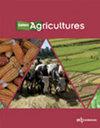2019冠状病毒病疫情对非洲乳业的早期影响:布基纳法索、肯尼亚、马达加斯加和塞内加尔的案例
IF 1.1
4区 农林科学
Q3 AGRICULTURE, MULTIDISCIPLINARY
引用次数: 8
摘要
本文对2019冠状病毒病疫情及其后续应对措施对非洲牛奶生产、收集、加工、销售和消费的影响进行了早期评估。我们重点关注第一波疫情爆发前后的时期(2020年2月至6月),在此期间病例数量激增,并采取了许多措施来遏制这一流行病。这篇论文基于非洲牛奶研究项目涵盖的四个国家的报告:布基纳法索、肯尼亚、马达加斯加和塞内加尔。数据主要是从这些国家的9家乳制品加工商收集的。该研究的主要结论是:(1)当健康危机恰逢牛奶生产季节高峰期时,当政府没有采取措施支持牛奶生产时,奶农受到COVID-19措施的负面影响。(2)小型和非正式的牛奶收集者也受到交通限制的影响,因为他们无法获得交通许可证。(三)疫情期间,奶粉进口未受影响。(4)乳品加工商(尤其是小的)面临许多限制其经营的挑战。旅行限制导致牛奶供应暂时中断,由于员工保护和安全措施,加工成本增加。(5)许多小型零售商受到公共交通禁令的影响,减少了手工乳制品的购买量;与此同时,在长时间的宵禁加上恶劣的储存条件下,乳制品的腐败现象增加了。由于与工业乳制品加工商和批发商的联系,超市能够在大流行期间增加市场份额。(6)由于购买力下降,大部分消费者减少了乳制品的消费。在某些情况下,消费量增加(由于斋月和旱季高温),消费转向长效乳制品。(7)总体而言,健康危机的后果影响到更多的小型和非正式乳制品供应链,而不是更大的供应链,后者更正式,更有组织,最终更有弹性地面对这种全球危机。本文章由计算机程序翻译,如有差异,请以英文原文为准。
Early effects of the COVID-19 outbreak on the African dairy industry: Cases of Burkina Faso, Kenya, Madagascar, and Senegal
This paper provides an early assessment of the effects of the COVID-19 outbreak and of subsequent response measures on milk production, collection, processing, marketing and consumption in Africa. We focus on the period surrounding the first wave of the outbreak (from February to June 2020), during which the number of cases surged and many steps were taken to curb the epidemic. The paper is based on reports from four countries covered by the Africa-Milk Research Project: Burkina Faso, Kenya, Madagascar and Senegal. Data was collected primarily from nine dairy processors located in those countries. Major conclusions of the study are: (1) Dairy farmers were negatively affected by COVID-19 measures when the health crisis coincided with the peak of the milk production season, and when governments did not take steps to support milk production. (2) Small and informal milk collectors were also affected by traffic restrictions as they could not obtain traffic permits. (3) Milk powder importation remained unaffected during the outbreak. (4) Dairy processors (particularly small ones) faced many challenges restricting their operation. Travel restrictions led to temporary interruptions of milk supply, and because of employee protection and safety measures, processing costs increased. (5) Many small retailers were affected by bans on public transport and reduced their purchases of artisanal dairy products; meanwhile, spoilage of dairy products increased during long curfews coupled with poor storage conditions. Supermarkets were able to increase their market share during the pandemic thanks to their connections with industrial dairy processors and wholesalers. (6) A majority of consumers decreased their consumption of dairy products due to a decrease of purchasing power. In some cases, an increase in consumption occurred (due to Ramadan month and dry season high temperatures) and consumption shifted towards long-life dairy products. (7) Overall, the consequences of the health crisis affected more small and informal dairy supply chains than the larger ones, which are more formal, better organised and finally more resilient to face this kind of global crisis.
求助全文
通过发布文献求助,成功后即可免费获取论文全文。
去求助
来源期刊

Cahiers Agricultures
农林科学-农业综合
CiteScore
2.00
自引率
22.20%
发文量
23
审稿时长
3 months
期刊介绍:
Cahiers Agricultures is a - mainly - French language scientific journal on world farming systems, how they are changing and their role in society. It is aimed at all those – researchers, field workers, teachers – who are interested in a holistic reflection on the agricultural world.
Cahiers Agricultures gives priority to research on agriculture as implemented by farmers, that has meaning for citizens in countries in the North and South, as opposed to research work conducted in a controlled environment (laboratory, research center, etc.). Research of this type is often multidisciplinary and takes into account the knowledge and know-how of the different stakeholders. The different parties are also actively involved in research, alongside the scientists. In this way, the journal stimulates debate on issues linked to society, such as the impact of using water and nitrogen fertilisers, peri-urban farming, fish farming, livestock production in rural areas, food security, etc.
 求助内容:
求助内容: 应助结果提醒方式:
应助结果提醒方式:


